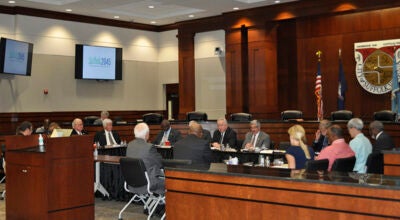Sued 15 years later
Published 5:43 pm Saturday, August 22, 2015
On the date Scott Theodus Boone is accused of damaging a guardrail on Holland Road in an accident, the population of the city was only about 64,000. The hit song on America’s pop charts was by Christina Aguilera. The Sept. 11 terrorist attacks were still 11 months in the future.
The date was Oct. 12, 2000. Babies born on that date are now in high school.
But it took the Virginia Department of Transportation almost 15 years to get around to pursuing payment from Boone for the damage he allegedly caused to the guardrail.
Taking so long is actually legal, as the state didn’t have a statute of limitations for seeking expenses to repair damage to state property from car accidents until 2014. The limitation now is five years, but the General Assembly did not make it retroactive when it enacted the law.
“The General Assembly could have stated this applied retroactively had that been their intent,” said Laurel Huerkamp, a lawyer in the Attorney General’s office who argued the state’s case against Boone in Suffolk General District Court on Wednesday last week.
“I quite frankly was shocked to see this on my desk,” said Anna Jane Zarndt, a senior attorney for the Virginia Legal Aid Society who represented Boone. “I’m sure Mr. Boone was shocked to get these pleadings in the mail.”
Judge Alfred W. Bates III, however, agreed with Huerkamp that the statute of limitations does not apply in the case and also dismissed Zarndt’s plea to apply the doctrine of laches, which says a legal claim should not be allowed if a long delay in asserting the claim has hurt the case of the defendant.
“He remembers very little about it to present in his defense,” Zarndt said.
Even so, the case went to trial. The police officer, now a sheriff’s deputy, who happened upon the nighttime crash said Boone told him he was going 70 miles per hour around a curve. He estimated the damage to the guardrail at $300.
But the Virginia Department of Transportation sent Boone a bill the following month for $2,806.50, according to evidence presented in court. Boone testified he never received it.
Boone said he remembers crashing because he saw a tractor-trailer bearing down on him in his rearview mirror.
“When I flinched, I lost control of my car,” he said. “I was ran off the roadway.”
Zarndt argued that the state had failed to prove its case.
“Nobody witnessed Mr. Boone speed or drive recklessly whatsoever,” she said. “It’s not conclusive of the defendant being the cause of the damage or the exclusive cause of the damage by any stretch.”
She also pointed out that the state billed nearly 10 times what the police officer estimated the damage was and cannot provide an itemized statement showing why it cost so much to repair.
“The commonwealth had 16 years to prepare this case,” Zarndt said. “I feel like they could have come up with an itemization.”
Bates said that although he wasn’t sure if he bought the defendant’s testimony, the burden of proof lies with the commonwealth.
“I don’t know that the plaintiff has met its burden satisfactorily,” he said.
Boone got off the hook for paying his bill, but others haven’t been so lucky. Shortly after Boone’s case, Bates entered judgment against Brian Melton Edney, who testified he spun on black ice on Interstate 664 in Suffolk on Feb. 17, 2003, and rolled into the guardrail.
“If any damage was there, it was already there,” he testified Wednesday.
Edney now owes the $342 the state says it spent repairing his guardrail damage.
“I think it’s wrong,” Edney said of the age of the case.
Michael Kelly, director of communications for the Attorney General’s office, had this to say when asked why the office is pursuing cases so long after the original incident: “In each of these cases, demands for payment are made on the defendants prior to trial, so it wasn’t the first they were hearing about things.”





